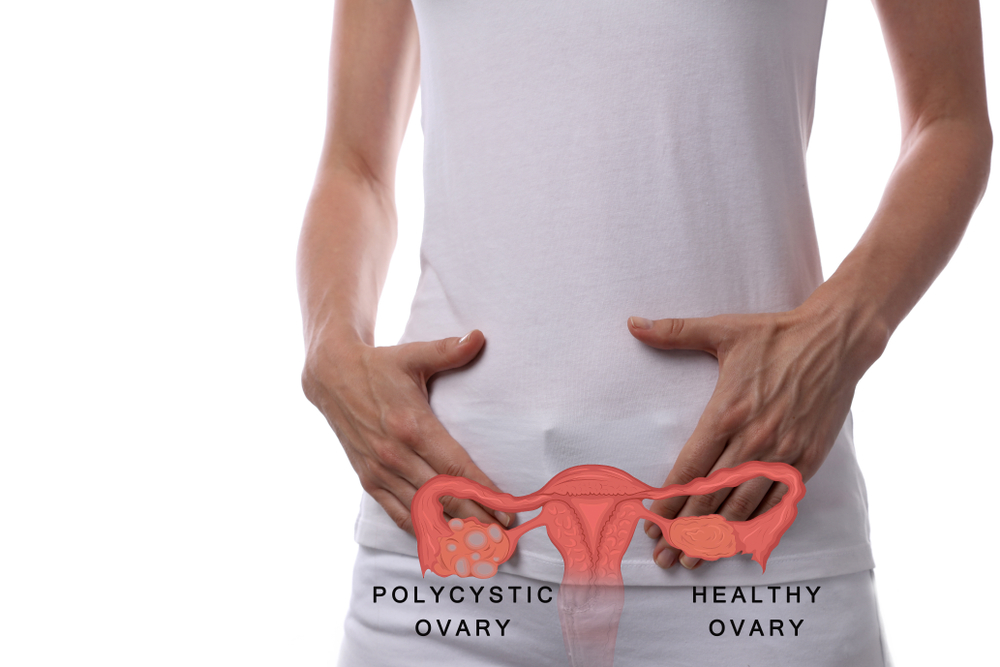How Does PCOS Affect Fertility?

Up to 10 percent of reproductive-age women have Polycystic Ovarian Syndrome (PCOS), yet many patients may not be aware they are affected by this condition until they are attempting to conceive.
PCOS is a condition marked by irregular or absent ovulation that presents as irregular menstrual cycles. PCOS may be accompanied by symptoms associated with elevated levels of male hormones, such as testosterone, which can cause hair growth on the face and body (also known as hirsutism), and acne. Unfortunately, the biological cause of PCOS is unknown. Researchers have proposed that insulin resistance and other hormone imbalances and genetic predisposition are ultimately responsible for the condition, though no clear cut etiology has been identified. Ultimately, the early diagnosis and treatment are important in order to help manage symptoms and prevent long term health issues.
Even though most individuals with PCOS are diagnosed in their reproductive years when they are trying to conceive, PCOS can present at any age after puberty. To be diagnosed with PCOS, an individual must exhibit two of the following three conditions:
- Irregular cycles
- Elevated androgens, as evidenced by hirsutism or blood tests
- Polycystic appearing ovaries, which can appear on ultrasound as small fluid-filled sacs or follicles that fail to release eggs. In some women with PCOS, the number and pattern has a typical appearance.
Additionally, other conditions that cause similar symptoms must be ruled out. For example, hypothyroidism and elevated levels of prolactin, a hormone, can produce some of the same symptoms as PCOS.
PCOS is one of the most common, but treatable, causes of infertility in women. Irregular or even absent ovulation of an egg makes it even more challenging for women to get pregnant. However, getting pregnant naturally with PCOS is not impossible. Women with PCOS do ovulate, albeit usually less frequently, making conception harder or unable to accurately plan. It is generally recommended that individuals diagnosed with PCOS consult a gynecologist or see a reproductive endocrinologist, especially if they want to increase their likelihood of becoming pregnant. Having the guidance and advice of an expert in the field can be helpful, as experts can help develop a treatment plan that aligns with a patient’s family building goals.
If an individual with PCOS does want to get pregnant and is having a hard time doing so naturally, there are several treatment options. The most commonly used treatment includes introducing medications such as Clomid or Letrozole, both of which are fertility pills that help increase the likelihood of ovulation.
In patients with PCOS who do not ovulate or conceive in response to fertility pills, in vitro fertilization (IVF) is generally recommended and can be highly successful.
Regardless of an individual’s desire to start a family, there are certain lifestyle changes an individual with PCOS can employ in order to improve symptoms. Obesity associated with PCOS can worsen complications of the disorder. Many doctors, therefore, encourage individuals with PCOS to try to lose weight through healthy eating and regular physical activity. Low carbohydrate diets have been shown to be impactful. Even a modest reduction in weight can improve symptoms, make menstrual cycles more regular, restore ovulation, and improve fertility.
Fertility is not the only complication individuals with PCOS may experience. Individuals with PCOS may also have a slightly higher risk for diabetes and cardiac ailments, such as high blood pressure and cardiovascular disease. Individuals with PCOS should mention their diagnosis to their primary care provider so that they can be watched more closely for complications.
PCOS patients may be at a higher risk for endometrial cancer. In individuals who are not regulating their menstrual cycles through medication, the lining of the uterus can build up and get too thick. This can result in a precancerous condition called hyperplasia which, if not treated, can eventually become cancerous. Hormonal birth control, including the pill or a periodic progesterone pill, can help regulate the menstrual cycle of individuals who do not want to get pregnant.
Ultimately, PCOS can be problematic, but with appropriate diagnosis, life style changes, and treatments, can be successfully managed.
